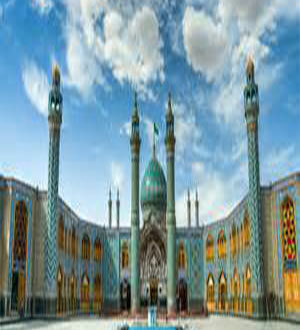An Event from Imam al-Hasan (a.s.)
A Syrian man saw Imam al-Hasan (a.s.) in the path and started calling him with insults. When he ultimately became silent, Imam al-Hasan (a.s.) paid attention towards him, saluted, smiled and said: “I assume that you are a stranger in the town, perhaps you have misunderstood the facts, if you offer an apology, I would be contended with you, if you need anything I would provide it to you, if you are a destitute I would make you needless, if you are exiled I would provide shelter for you, if you have any special need, I would bestow upon you; I have plenty of wealth and a large house, if you enter into my home and be my guest, it would be better for you.”
After the Syrian man heard these words, he wept and said: “I testify that you are the Caliph of God and Imam. God knows better where to place the Caliphate and Imamate. O son of the Holy Prophet (S), before our meeting you and your father were the worst enemies near me; but at present I consider you as the most superior creatures of God, then he entered into his house and as long as he lived in Medina, was the guest of that noble one.”7
Third Imam (a.s.)
Imam al-Husain (a.s.) was born on the third of the Holy Month of Sh’aban in forth year AH in Medina, his father8 was Imam Ali ibn Abu Talib (a.s.) and his mother was Fatimah al-Zahra (SA), daughter of the Holy Prophet (S).
Imam al-Hasan (a.s.) through God’s command appointed his brother Imam al-Husain (a.s.) to Caliphate and Imamate. During Mu’awiyah’s Caliphate; he lived under very severe and harsh conditions because the commandments and laws of religion were not executed, and God and the Holy Prophet’s (S) commandments were replaced with Mu’awiyah’s personal whims and desires.
Mu’awiyah’s institutions did not leave any stone unturned in the destruction of Ahl al-Bayt (a.s.) and Shi’a of Imam Ali (a.s.). With all these unpleasant circumstances, he practiced patience and self-restraint until Mu’awiyah died and his son Yazid became his successor. Yazid ordered the Governor of Medina to seek his allegiance from Imam al-Husain (a.s.) and in case of his refusal, he should be executed.
The Governor of Medina announced Yazid’s orders to that noble one; Imam al-Husain (a.s.) requested permission of one night in order to think about the situation. But since he did not consider the allegiance and signing of Caliphate in the interest of Islam and his life was in danger, he was forced to move towards Mecca and to stay inside the immune sacred sanctuary of God; thus he moved towards Mecca and entered it on the third of the Holy Month of Sh’aban.
The story of Yazid and Imam al-Husain (a.s.) and his movement was circulated among the cities. The people of Iraq who were opposed to the Government of Mu’awiyah and Yazid, especially the people of Kufa, wrote a significant number of letters to Imam al-Husain (a.s.) and invited him to Iraq.
On the other hand Imam al-Husain (a.s.) realized that Mu’awiyah and Yazid had trampled all commandments of the Islam. In order to secure their rule and position they had not hesitated to commit all sorts of illegitimate acts, tyranny and oppression. They ruled in the name of Islam and considered themselves as successors of the Holy Prophet (S); there was a fear that they would completely turn fundamentals of Islam as upside down. Now they wanted of him that he should testify the authenticity of their government officially; on the other hand Yazid has secretly assigned a group to murder the Imam al-Husain (a.s.) in Mecca, or they should arrest him alive.
It was under these circumstances that Imam al-Husain (a.s.) decided that in order to secure the basic essence of Islam, confront the injustice of Bani Umayyah, and guard the sanctity of the House of God, he should leave Mecca and should rise up against Yazid’s tyrannical institution. Thus, he moved towards Kufa which was the center of the Shi’a, they had promised their support and cooperation, and perhaps to achieve his lost rights to confront Bani Umayyah. Yazid’s Army besieged and didn’t allow him to reach Kufa.
Then the order arrived from Yazid that if Imam al-Husain (a.s.) surrenders take allegiance with him, dispatch him towards me so that I could decide about him, and in case if he did not surrender, fight with him. Imam al-Husain (a.s.) did not give himself to wretchedness, he did not make compromise with the tyrant Government of Yazid; instead he fought, and with his small army stood up against the huge army of Yazid. He fought with perfect valiancy and bravery and killed a group of his enemies. Ultimately, he himself, his brothers, and sons drank from the chalice of martyrdom; they were killed on the tenth of Muharram in the year 61 AH, and were buried in Karbala, Iraq. Imam al-Husain (a.s.) lived in this world for a period of fifty-seven years.
We Shi’a consider the Day of ’Ashura as day of sorrow and lamination and for the remembrance of epic and valiant martyrdom, organize large congregational assemblies so that the spirit of self- sacrificing and confrontation against injustice and oppression should remain alive among the nations. The objective of Imam al-Husain (a.s.) was defense of religion and confrontation with oppression, we too never forget about this sacred objective. Imam al-Husain didn’t surrender his body to degradation and wretchedness and taught Muslims to offer self-sacrificing and extreme devotion.
Imam al-Husain (a.s.) was killed but was not defeated. He made the supreme and distinguished virtues of human beings alive forever; practically taught the people self-sacrificing, extreme devotion, righteousness, and confrontation with injustice and tyranny. He was able to expose and degrade Yazid and Bani Umayyah who were ruling in the name of Caliph of the Holy Prophet (S), and proved their shameful deeds as false. He made the pillars of Umayyad Governments tremble and destroyed their dangerous plot against the Islam.
Organization of assemblies of crying and lamination only in itself does not insure the exalted objective of Imam al-Husain (a.s.), instead his sacred objective must be identified and efforts and endeavors should be made for its pursuit accordingly.
Fourth Imam (a.s.)
The fourth Imam, Imam Ali ibn al-Husain (a.s.), was born on the fifteenth of Jamada al-Thani 38 AH in the Holy City of Medina. His father was Imam al-Husain (a.s.) and mother was Shaher Bano, daughter of the Yazdgerd, Emperor of Iran. Imam al-Husain (a.s.) appointed him for Caliphate and Imamate through God’s command.9
Imam al-Sajjad (a.s.) made so many efforts and endeavors in prostration and worshipping that he was called al-Sajjad and Zain al-A’abidin. He was present in the incident of Karbala but since he was sick, he was not killed (in battle); during his journey from Karbala to Kufa and Damascus he delivered eloquent speeches and proved the sacred objective and truthfulness of his exalted father and the heart-burning, horrible tragedy of the Martyrs of Karbala and their path of honesty to the attention of the general masses.
Since Imam al-Sajjad (a.s.) did not have freedom and was not in a position to propagate Islamic learning and knowledge and commandments of religion among the people, he was forced to sit in isolation. He kept himself busied in worshipping God and utilized opportunities to nourish and train the individuals. In order for the publication of religious learning he pursued another path; i.e. he presented religious learning in the form of prayers.
Excellent prayers have remained from him; one of this most precious works consists of the book of: Sahifeh Sajjadiyeh; Imam al-Sajjad (a.s.) lived in this world for 57 years and on twenty-fifth of the Month of Moharram in the year 95 AH, he was martyred in Medina and was buried in the Baq’i Cemetery. Imam al-Sajjad (a.s.) liked that orphaned children, blind, crippled, and the destitute should appear at his table-spread and many times he gave them food by his own blessed hands; he provided food and dress for many poor people of Medina. During the night when the people were sleeping he carried the food upon his back and covered his face so that no one could identify him.
He went to the doors of poor and destitute and distributed food among them; it happened very often that the deserving ones were standing upon doors of their house waiting for the arrival of Imam al- Sajjad (a.s.). When they saw him, they gave the glad tidings of his arrival to each other but no one identified him and knew who the source of their food was. When Imam a-Sajjad (a.s.) died the poor of Medina understood that unidentified man was Imam Zain al-A’abedin (a.s.) and it was only then that the sound of their loud cries were raised.10

 Mouood Mouood English Edition
Mouood Mouood English Edition



